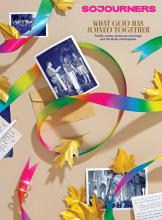HABITS ARE FORMED in response to contextual cues. The stronger the cue, the harder it is for our minds to access alternative responses.
We just spent four years resisting. We became experts at pushing back, filling public squares, locking arms. Some of us also built habits of self-care. We would receive the cue for a big justice push and, without thinking, plan a day of hibernation on the other side. These habits were (and are) beautiful and necessary. But now we live in a new context. The old cues that triggered those habits will come less and less frequently. It is entirely possible that a year from now we could find ourselves coasting on autopilot rather than establishing new habits of dreaming and building what we dream.
By the end of the Civil War, 4 million enslaved people of African descent were sustaining themselves with survival habits cultivated and passed down over the course of 250 years. They found themselves in a brand-new context on April 10, 1865. Survival was no longer the highest goal. Now they were free to dream.
Read the Full Article

